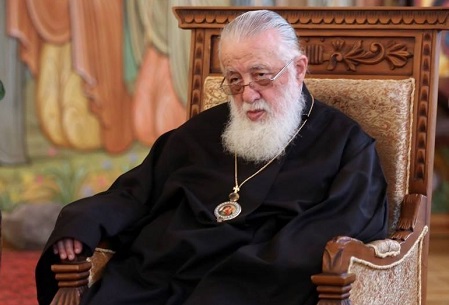Georgia’s Patriarch Ilia II turns 85, marks 40th anniversary of consecration

Today the Catholics Patriarch of Georgia Ilia II turned 85. He has lead the spiritual life of the Orthodox Georgian parish for the past 40 years.
The patriarch declined to mark the date with a large celebration as there was "no time and [this was not the] situation for this,” the Patriarch’s doctor said.
Georgia’s top state figures and other officials visited Ilia II at the Patriarchate to congratulate him.

The prime minister evaluated the patriarch's activities as vitally important. Photo by prime minister's press office.
Prime Minister Giorgi Kvirikashvili told the Patriarch that his role in the country was not only a merciful one, but also vitally important.
Your being the patriarch of Georgia is a huge strength for the country,” Kvirikashvili said.
The PM also highlighted the importance of completing scientific works on two "essential publications” - the Old Testament and the Mtskheturi Bible.

The president and the PM thanked the scientific group which worked on the new publications of the Bible. Photo by the president's press office.
President Giorgi Margvelashvili stated that the patriarch was a living example of a person who could defeat the evil.
We can see a person who defeated a range of challenges a human may face in the lifetime and turn himself and the state powerful,” Margvelashvili said.
The patriarch received guests with the presence of interim patriarch, Senaki and Chkhorotskhu Metropolitan Shio Mujiri, who he named in the role unexpectedly on November 23, 2017, during the Saint George’s day service.

Interim Patriarch Shio,49, in the middle. He has known president Margvelashvili (R) since his early years. Photo by the president's press office.
Interim patriarchs serve as the patriarch on a temporary basis in case the serving Patriarch is ill, resigns or is absent for a long period of time.
In case of the death of the patriarch, the interim patriarch serves on an interim basis until a new patriarch is elected by a group of bishops called a Holy Synod.
Mujiri had already served as one of Ilia II’s three designated chorepiscopi —who are authorized to sign orders on behalf of the patriarchate.
Early years
Ilia II had to take the responsibility of being a Catholics Patriarch of Georgia in a very hard period, when Christianity was suffering significant suppression under official Soviet ideology.
Ilia II was born as Irakli Ghudushauri-Shiolashvili in Vladikavkaz, currently Russia's North Ossetia.
In 1967 he was consecrated as the bishop of Tskhumi and Abkhazeti in the western, currently occupied region, and elevated to the rank of metropolitan in 1969.
After the death of Patriarch David V, he was elected the new Catholics-Patriarch of Georgia on December 25, 1977.

Ilia II became the patriarch when he was 44-year-old.
In the new position Ilia II initiated a range of reforms, enabling the Georgian Orthodox Church to largely regain its former influence and prestige by the late 1980s.
In 1988 there were only 180 priests, 40 monks, and 15 nuns for the faithful, who were variously estimated as being from one to three million.
There were 200 churches, one seminary, three convents, and four monasteries. During the last years of the Soviet Union, Ilia II was actively involved in Georgia's social life.
From 1978 to 1983, Ilia II was Co-President of the World Council of Churches (WCC), an ecumenical organisation the Georgian Orthodox Church had joined with other Soviet churches in 1962. In May 1997, the Holy Synod of the Georgian Orthodox Church announced its withdrawal from the WCC.
Currently there are about 2,000 acting churches and monasteries in Georgia and up to 3,000 monks and nuns.
 Tweet
Tweet  Share
Share